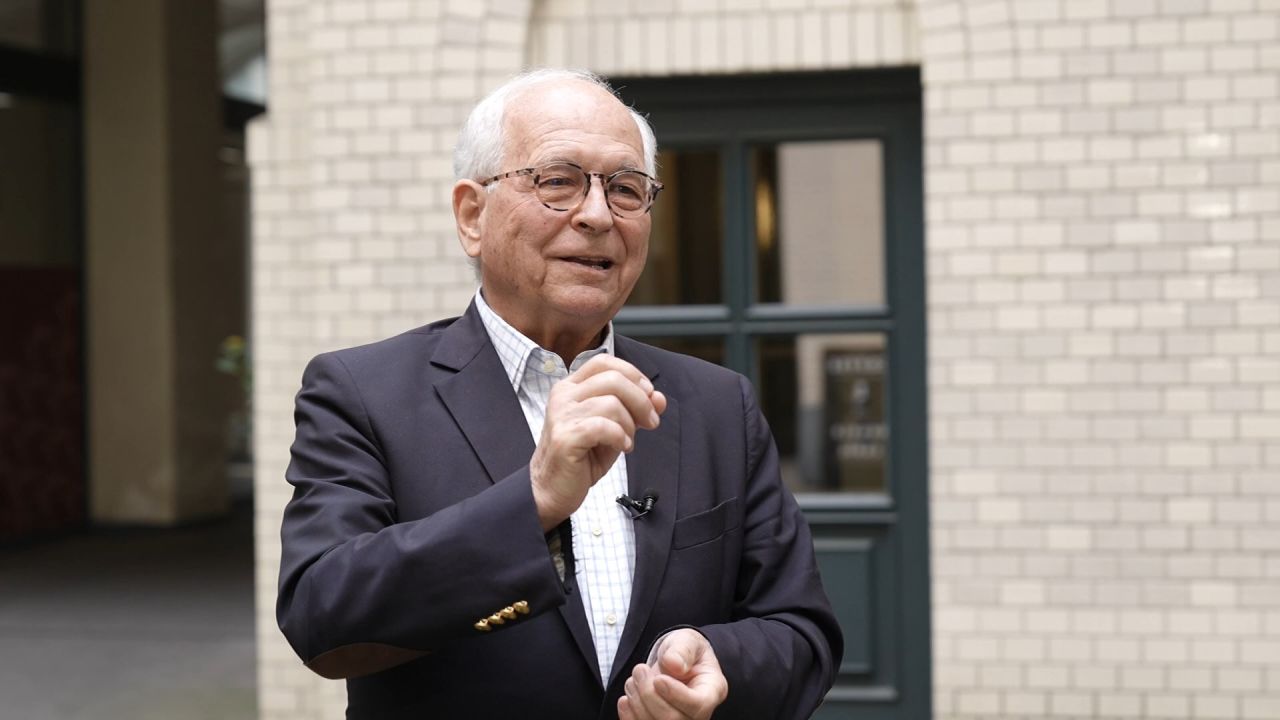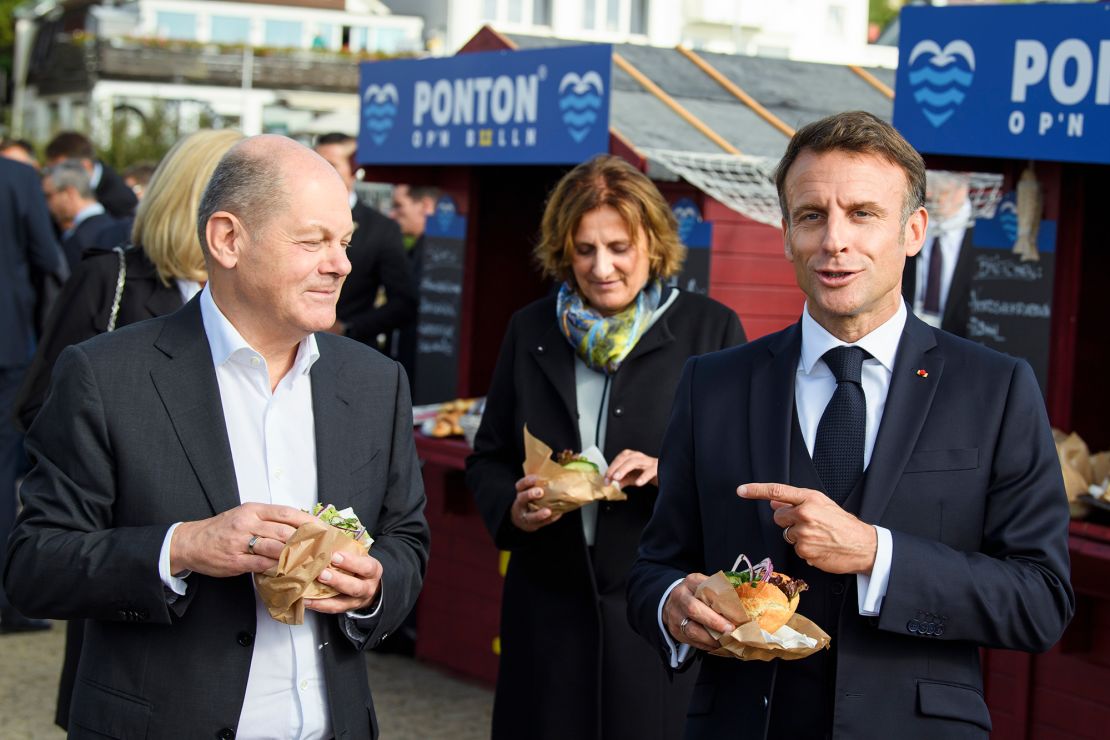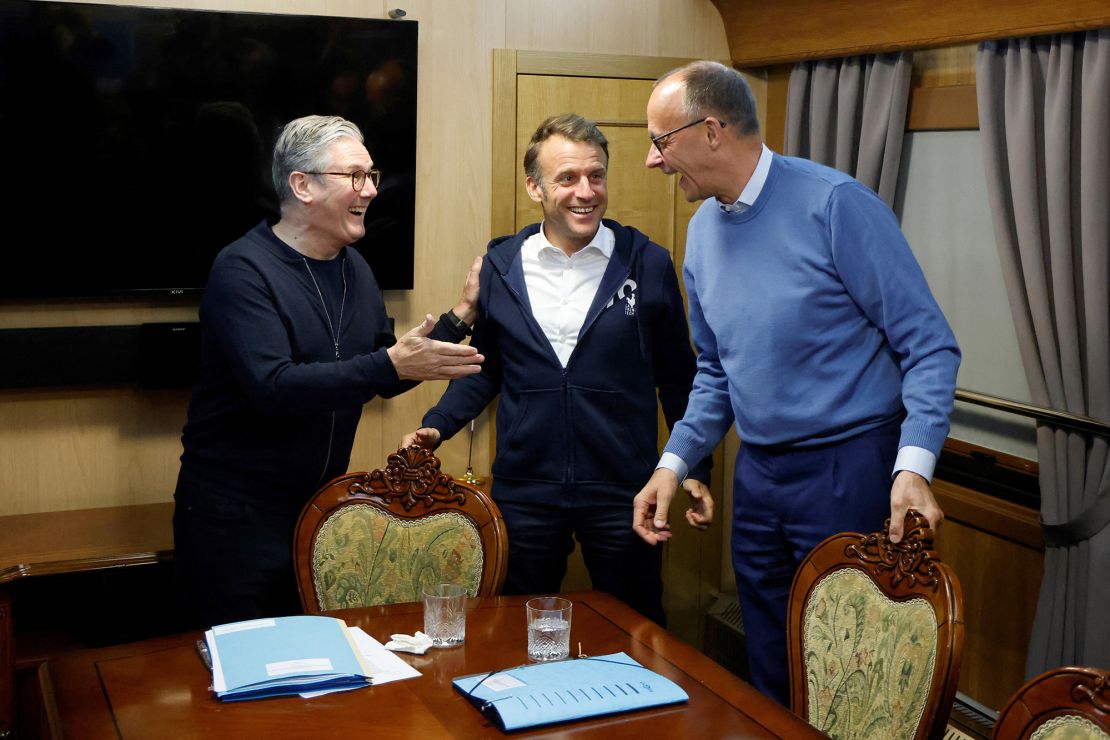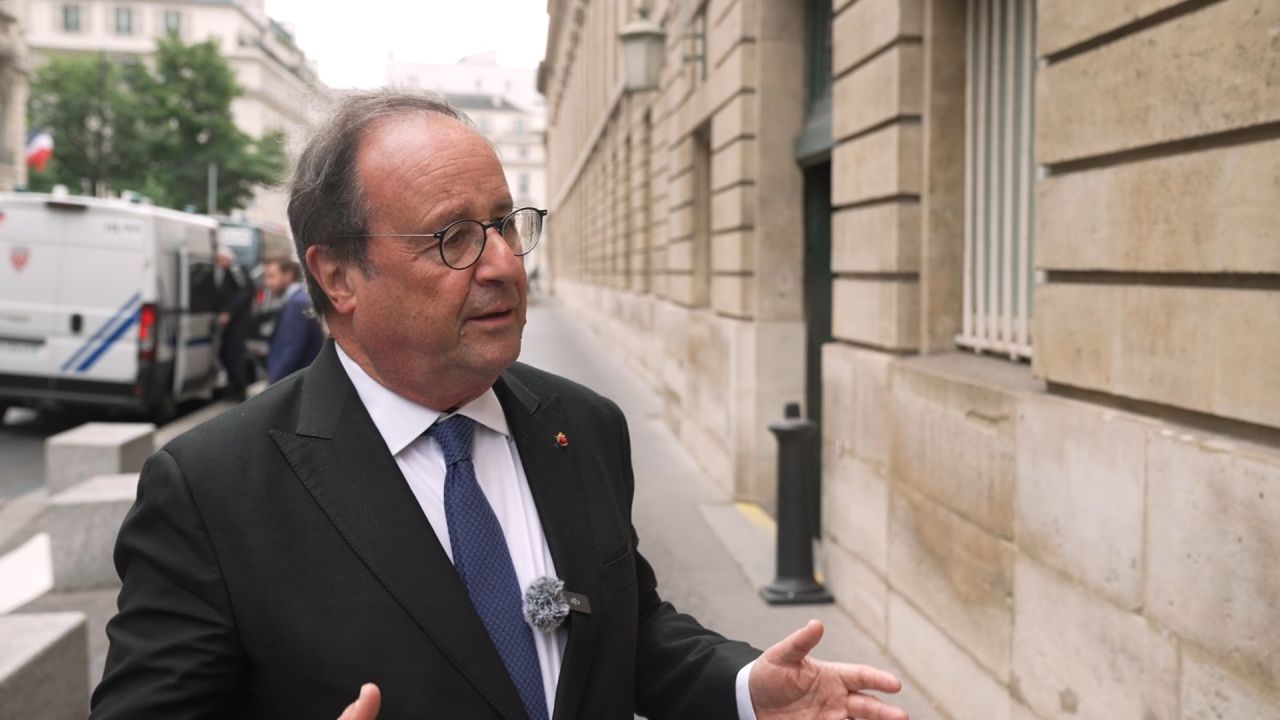Berlin and Paris
CNN
—
The clasped hands of French and German leaders have long embodied the spirit of European unity – most famously in 1984, when François Mitterrand and Helmut Kohl stood hand-in-hand at Verdun in a symbol of reconciliation.
So, when Chancellor Friedrich Merz grasped President Emmanuel Macron’s hand on the steps of the Élysée palace in early May – a handshake that was long, warm, and accompanied by backslapping – it wasn’t just a photo-op.
It was the clearest sign yet that Europe’s most important alliance was back in motion. After years of sputtering and frustration under Olaf Scholz, the Franco-German engine is humming again, and it has a new name: Merzcron.
Since Merz’s election, the two have met six times – most recently with other NATO leaders at The Hague. They will sit down together again on Thursday at the European Council meeting in Brussels.
Their shared agenda: to drive the European Union response on security, Ukraine and Trump-era uncertainties, and shape Europe’s role on the global stage.
Ahead of Wednesday’s NATO summit, Macron and Merz laid out their vision in a joint opinion piece in the Financial Times.
“In these testing times, Germany and France – together with our European and transatlantic friends and allies – stand united and strong, to defend our common values as well as the freedom and security of our citizens,” they wrote.

They outlined plans to boost defense spending – aiming to reach 3.5% of GDP in core military investments – and to deepen cooperation between NATO and the EU, calling for a stronger, more sovereign Europe that is no longer reliant on others for its security. They pledged to ensure Ukraine emerges “prosperous, robust and secure,” and warned that European stability for decades to come hangs in the balance.
The signs are that the powerful ‘Mercron’ or ‘Merkozy’ alliance, portmanteaus derived from the names of former German Chancellor Angela Merkel, Macron and his predecessor Nicholas Sarkozy, is evolving into an equally influential ‘Merzcron.’
The two-day European Council summit now underway in Brussels, hot on the heels of a G7 meeting in Canada and the NATO leaders’ summit in The Hague, is the first of Merz’s chancellorship. It will likely be another demonstration of how strong this union could be.
CNN spoke to two stalwarts of the Franco-German partnership – former French President Francois Hollande, who worked closely with Merkel, and Wolfgang Ischinger, a former German deputy secretary of state once described as Europe’s most connected former diplomat – to assess its significance for Europe and the world.

Wolfgang Ischinger, former German deputy secretary of state, says Germany and France need to act as catalyst
Under Scholz, the former German chancellor, the Berlin-Paris axis became strained, something that both Ischinger and Hollande noted.
Stefan Seidendorf, director at the Franco-German Institute in Ludwigsburg, Germany, said Scholz spent so much time doing “domestic homework” that he was never able to fully focus on Europe.
The three-way coalition he headed was beset with infighting on domestic and Europe issues and eventually collapsed in November last year, triggering an early election.
However, there were also some interpersonal issues at play. “It was difficult for Macron to get along with this very Protestant, northern German, not very emotional, not into the big symbols of political leadership,” Siedendorf told CNN in a phone interview.
He added that the same went for Scholz, “who found it difficult to get along with this French president living in the palace of Élysée with all the gold and the glitter and the ceremony.”

But neither was Macron and Merz’s friendship a given, considering their different styles. Macron, 47, is Jupiterian and theatrical, hailed by some as a visionary, dismissed by others as a narcissist. Merz, 69, is impulsive, prickly under pressure and occasionally leans into populist bluster.
That said, Ischinger said both leaders “met rather easily – and got their act together.” Speaking about their shared character traits, he said they “love interaction. They enjoy difficult questions. These two have a way of understanding each other – they are open.”
The clearest display of “Merzcron” in action has been around support for Ukraine. Hollande told CNN the duo had already been “effective” on the issue.
Their recent trip to Kyiv, alongside British and Polish leaders Keir Starmer and Donald Tusk, “was a symbol of a new kind of determined getting-together of the major European powers to make progress,” Ischinger said.

Paris has long been more hawkish than Berlin on its support for Ukraine. Macron has been a strong proponent of boots on the ground in the country and has allowed Ukraine to fire French-made long-range missiles deep into Russia.
However, Hollande said, “we’ve seen that Merz’s position is a bit different from that of his predecessor… including on the delivery of missiles capable of reaching Russian territory.”
Since taking office, Merz has welcomed Ukraine’s President Volodymyr Zelensky to Berlin and unveiled a new $5 billion package for Ukraine that includes joint co-operation in the development of long-range missiles capable of being fired deep into Russia, some of which could be online by the end of the year.
“Now we’re in perfect unity,” Ischinger said of the Franco-German alignment on Ukraine.
Russia’s unease over a more coordinated Franco-German approach to Ukraine is already starting to show.

News of last month’s visit to Kyiv by Merz and Macron was accompanied by the release of a photo taken ahead of a meeting between them. Sitting on the table was a white tissue.
Its presence sparked an online rumor, amplified by Kremlin officials and later traced back to pro-Russian accounts, that falsely claimed the crumpled tissue – which Macron picked up and pocketed – was a cocaine bag.
The Élysée countered by saying “when European unity becomes inconvenient, disinformation goes so far as to make a simple tissue look like drugs. This fake news is being spread by France’s enemies, both abroad and at home.”
US President Donald Trump’s return to the White House has also forced a new alignment between the European powerhouses, particularly on the issue of Europe’s security.
The Trump administration’s insistence that Europe should do more to defend itself triggered the shift, Hollande explained, saying that it “forced France and Germany to work together diplomatically and militarily, whereas until then, their main alignment had been on monetary issues.
“Today there is a shared responsibility. Germany must do more for its defense, and France must be willing to share a number of proposals and initiatives – including on defense – with Germany,” Hollande says.

Former French President Francois Hollande speaks about the importance of the Franco-German relationship
Before even formally taking office, Merz managed to push through the reform of Germany’s constitutional debt brake to unlock over half a trillion dollars in defense spending. He has also committed to creating Europe’s largest army. Both represent a major shift for Germany.
Previously, Hollande suggested, those moves might have been difficult for France to stomach.
“We used to be very reluctant about German rearmament. That was a politically sensitive issue after the war. But today, no one in France fears German rearmament –we welcome it,” he said.
Macron and Merz also appear to have taken a similar approach to dealing with Trump. Both have had effusive and positive meetings in the Oval Office with a president who has not always been so welcoming to visiting leaders.
Paris and Berlin are also trying to revive the decades-old “Weimar Triangle.” Established after German reunification in 1991, it aimed to bring Poland deeper into the European fold, led by Germany and France.
Ischinger feels the relative weight of the European Union has shifted eastwards due to the war in Ukraine, meaning that Warsaw, now more than ever, must now be a vital ally for Paris and Berlin. “Harmony (between France and Germany) is key, but it’s not sufficient,” he said.
“The center of gravity of the good old European Union was somewhere between France and Germany. But today, almost half of the members are to the east of Germany,” he added, and giving Poland more say is the best way to bring the continent together.
That shift, too, is already playing out. As well as taking part in the Kyiv trip, Tusk has found himself directly involved in European talks with Trump, as the US president has attempted to broker an end to the Russia-Ukraine war.

Poland’s status as Europe’s fastest growing economy, its commitment to NATO defense spending – way above other member states’ at 4.2% of GDP in 2024, projected to rise to 4.7% this year – and its geographic location bordering Russia, Ukraine and Belarus, have made the nation a key nexus for the continent.
Nonetheless, for Hollande, “Europe only moves forward when France and Germany speak with one voice and pull in the same direction. Only then can the European machine function properly.”
Ischinger added: “If Franco-German cooperation works well, you have a perfect precondition to get the entire European Union underway, moving forward.”
For now, the “Merzcron” engine is firing up and, if it keeps its momentum, it could pull the rest of Europe into gear.

